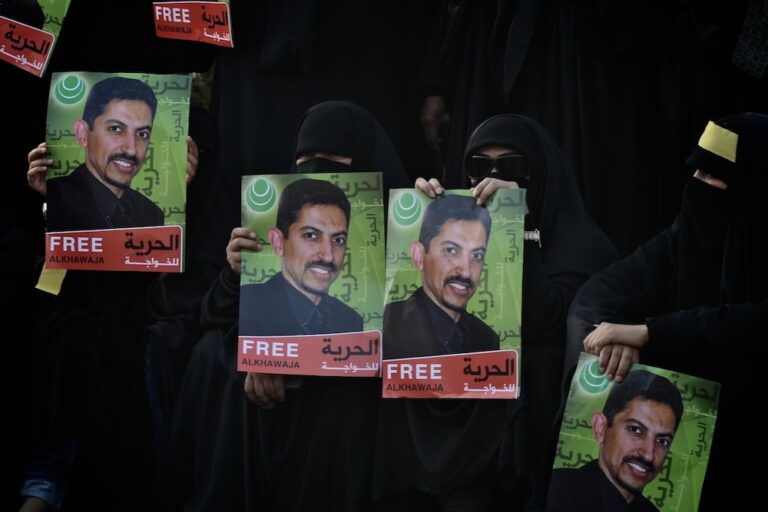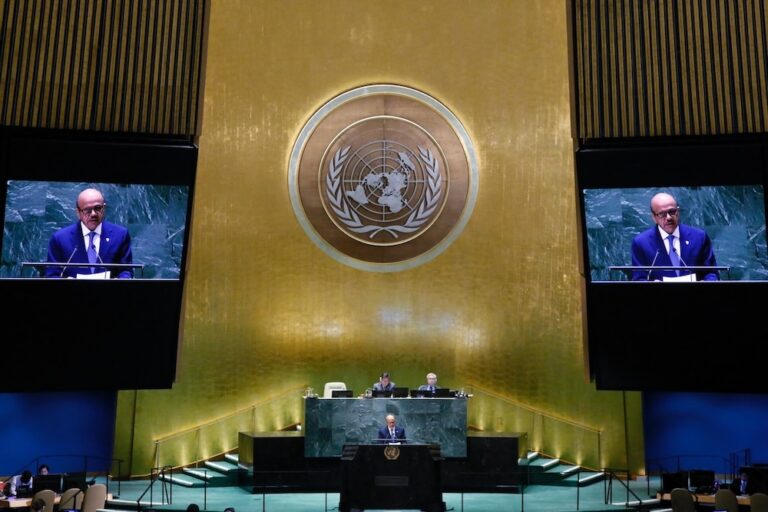Acts such as kidnapping and torture are not those of a governing body that pledges respect for human rights and the rule of law, says BCHR.
(BCHR/IFEX) – 28 August 2010 – The Bahrain Center for Human Rights has received with great concern information that Dr. Abduljalil Alsingace (Head of the Human Rights office at the HAQ movement) was subjected to severe physical and psychological torture which caused damage to his hearing and injuries to his back and other parts of his body.
The information received also mentioned the transfer of some activists and human rights defenders to hospitals, as a result of being tortured, including Shaikh Mohammed Habib Almuqdad (religious figure, human rights activist and president of Alzahra charity society of orphans), Abdulghani Khanjar (head of the national martyrs committee and torture victims, and the official spokesperson for the Truth and Justice coalition, which is made up 11 societies and organizations, both human rights and political), and Abdulhadi Alsaffer (active member of Committee against the rise in prices and the Detainees and families committees). The center has also been following up on the kidnappings committed by the national security militia in Bahraini villages.
One form of torture described by Dr. Alsingace to the public prosecutor, Nawaf Hamza, was that his hands were handcuffed and he was blindfolded the entire time that he was detained for more than two weeks, beginning on 13 August 2010. He was kept in solitary confinement, his prescription glasses were confiscated, and he was not allowed to shower for more than a week. His wheelchair and crutches were taken from him, and he was forced to go to and from the cell door, pulling himself with his arms. Alsingace was diagnosed with polio when he was two years old, which had resulted in the complete paralysis of one leg and partial paralysis in the other. He usually depends on a wheelchair for his mobility. As part of his torture he was kept standing on his partially paralyzed leg for two consecutive days.
Dr. Alsingace told the public prosecutor that he was repeatedly beaten on his fingers with a rigid object and slapped on both ears until he could barely hear. His nipples and earlobes were pulled with tongs, which caused severe pain which he was still suffering from during his meeting with the public prosecutor. He was beaten with a rigid object on his back, during the interrogation period, in order to force him to sign papers of unknown content; they would lift his blindfold just so he could sign but not read the content. They made him listen to the sound of electric machines to scare him, as well as threatened to rape him and his female family members. Whenever he would start to fall asleep, they would play sudden loud sounds or the sound of sharp tools to startle him (a new torture tactic used at the infamous Guantanamo prison). He was forced to listen to the screams of his fellow detainees in adjacent rooms. Dr. Alsingace demanded from the public prosecutor that he immediately be allowed to be treated by a doctor for his severely injured back and his ears.
On the evening of 26 August, witnesses told BCHR that they saw a large number of intelligence security forces in the Ministry of Interior’s Police Fort clinic in Manama. With them were two detained human rights defenders, Mr. Abdulghani Alkhanjar and Mr. Abdulhadi Alsaffar. They were then taken by police ambulance to an unknown destination, suspected to be the military hospital in Riffa. There was similar information about the detainee Alshaikh Mohammed Habib Almuqdad, a religious figure involved in defending human rights and who is the president of the Alzahra society for Orphans. BCHR still has no information about the conditions these detainees are in as a result of the solitary confinement enforced on them.
On 28 August, newspapers confirmed there was a ban on any publications about the case of Dr. Alsingace and the other detainees, which is currently being heard by the Public Prosecution. On the other hand, the defendants’ lawyer, Mohammed Altajer, as well as representatives of human rights organizations, condemned the terrorism law procedures used in dealing with Dr. Alsingace and the other detainees; procedures which clearly go against universal human rights standards.
BCHR has reason to believe that the Public Prosecutions ban is an attempt to censor the torture allegations and other violations committed by the national security forces. This confirms the clear complicity and absence of integrity and independence of the public prosecution, which is part of the judicial system. This decision may also confirm that the government is no longer able to convince public and international opinion of the announcement they hastily publicized about revealing a secret organized network which incites violence. Instead, they are resorting to getting confessions through torture and banning any publications except their own.
(. . .)
BCHR expresses its grave concern in regards to the arbitrary arrest, solitary confinement, torture and maltreatment of the detainees. The center considers the ambush of civilians and the arbitrary kidnapping and physical and sexual assault of those suspected of taking part in protests to be the act of uncontrolled gangs and militias. These are not the acts of a governing body that respects itself and allegedly respects human rights and the law.
(. . .)


